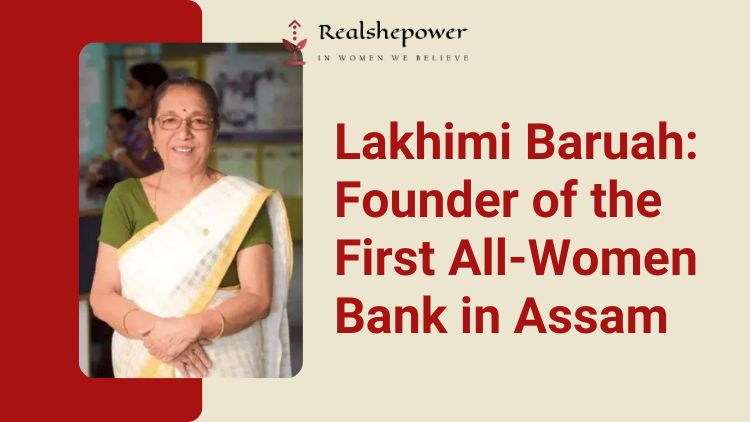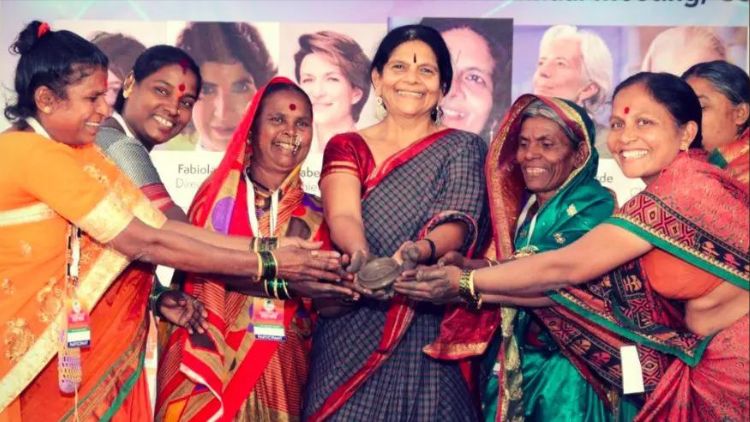Lakhimi Baruah: The Founder of First “All-Women” Bank in Assam, India


In 1998, Lakhimi Baruah started Konoklota Mahila Urban Cooperative Bank (KMUCB) in Jorhat district of Assam, India. Lakhimi wanted to make women from underprivileged backgrounds financially independent and secure. Thus she started a bank for women by women.
For her dedicated and consistent efforts to financially empower women of Assam, Lakhimi Baruah was named as one of the recipients of this year’s Padma Shri awards.
KMUCB has provided credit to thousands of women and made a positive change to their lives in Jorhat, Sivasagar and Golaghat districts.
After working for more than a decade in the region, Lakhimi realised that to bring a change, she had to start a bank. It is a bank for women and run by women.
Life and History
Lakhimi was born in the small village of Jorhat, Assam. Her mother passed away during her birth and her father died in her early teens. Financial dearth was not new to her. She had lived through scarcity and realised the importance of financial security at a very young age.
Lakhimi got married in 1973. She had earlier left studies due to lack of funds and chose to complete her graduation in 1980, seven years after her marriage. Thereon, she started working in a bank. In 1983, she founded Mahila Samiti in Dakshin Sarbaibandha area of Jorhat district, and worked closely with the underprivileged women.
In 1990, Baruah applied to the Reserve Bank of India to set up a cooperative bank for women. The approval came in 1998 and the bank was set up two years later in Jorhat with an initial investment of Rs. 8.45 lakh and 1,500 women members. The bank employs only women and now has four branches, 21 regular employees, and 45,000 account holders, mostly women.
So far, over 300 self-help groups have benefited from the bank’s credit schemes.
KMUCB: First All-Women Bank
“Most women were unaware of how banks functioned. My work in a cooperative bank made me realise that these women needed a bank that they could access easily, save their earnings and take easy loans when in need. That is how the idea to set up the bank came.”, Baruah told IndiaCSR Network.
- Women can open accounts with KMUCB with zero balance or as low as Rs20.
- Till now, the “all-women” bank has given loans to over 8,000 women and around 1,200 women self-help-groups.
- Its turnover for the last year was nearly Rs16 crore with a profit of Rs30 lakh
The bank gets over 250 customers in a day and has continuously evolved to bring change to people’s lives.
KMUCB is known for lending soft loans to its customers, which could be even be used for daily requirements like arranging safe drinking water, repairing their houses, paying children’s school fees, etc.
On 8 March 2016, KMUCB became one of the seven institutions to receive the ‘Nari Shakti Award‘ from then-President Pranab Mukherjee for its exceptional contribution to the empowerment of women.
Padma Shri 2021
As a proud recipient of this year’s Padma Shri, Lakhimi Baruah hopes that with this recognition “the government schemes or works related to MP or MLA local area development funds are also done through our bank so that we are able to expand and help more women.”
She said, “I am very encouraged and inspired by the honour. It is a recognition of the difficult and arduous task that we have taken up and been pursuing for years. I want to express my gratitude to all who have been part of this journey and hope we reach more women.”
Featured image source
Also Read:
Chetna Gala Sinha, Founder of First Rural Women Co-operative Bank

You can now write for RSP Magazine and be a part of the community. Share your stories and opinions with us here.
